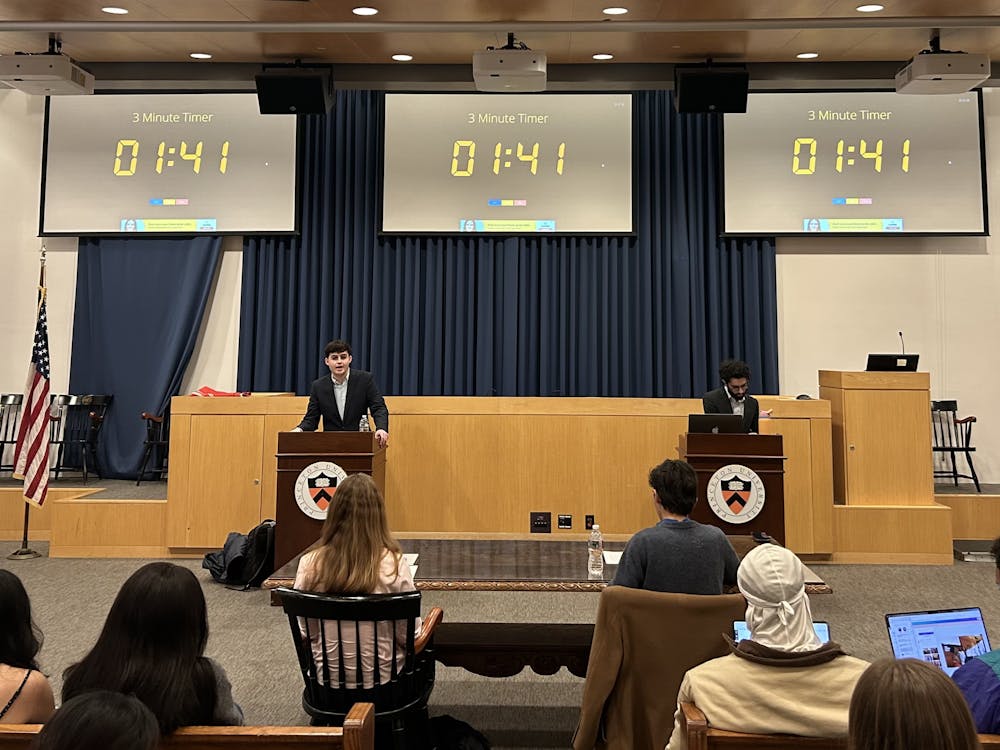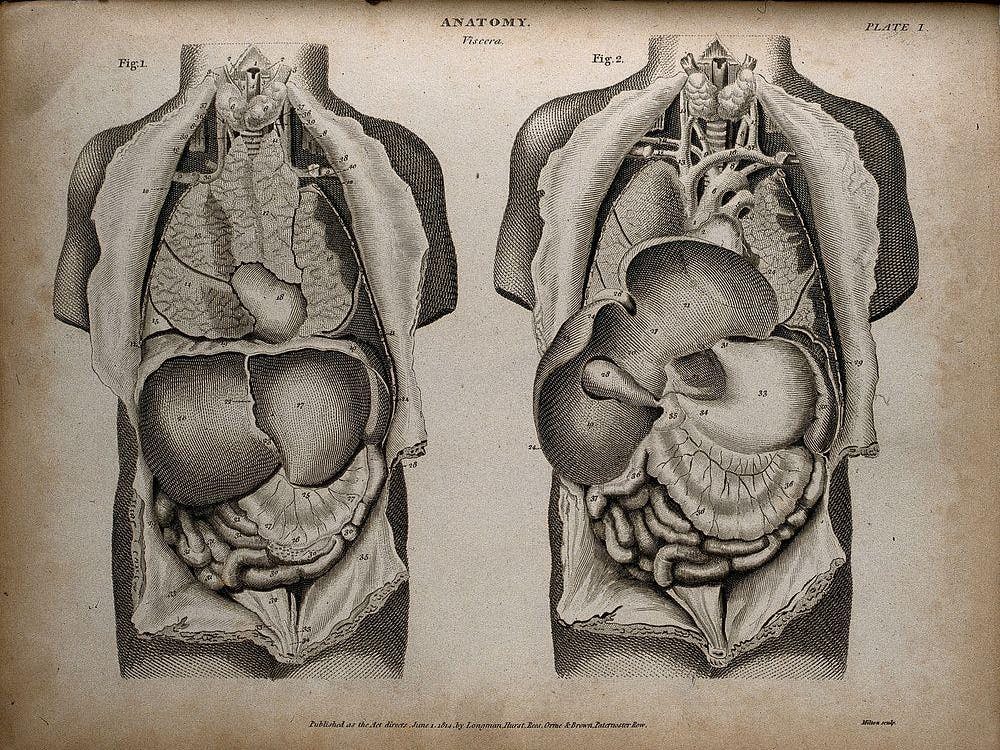Quentin Colόn Roosevelt ’27 and Aum Dhruv ’27, the presidential candidates in the upcoming Undergraduate Student Government (USG) election, discussed dining, transparency, and student engagement, among other issues at a debate on Friday. The debate was held by the American Whig-Cliosophic Society (Whig-Clio) and The Daily Princetonian.
Dhruv is a staff Audience creator for the ‘Prince.’
While the candidates broadly agreed on key issues such as dining and increasing club funding, they claimed differences in leadership style and experience. A major point of disagreement was the use of executive sessions, which are closed to non-USG members, during Senate meetings.
The debate was moderated by Khoa Sands ’26, the vice president of Whig-Clio, and Devon Rudolph ’28, an associate News editor and staff Sports writer for the ‘Prince.’ It was Sands’ third consecutive year moderating.
Colόn Roosevelt is a history major from Washington D.C., and Dhruv is an operations research and financial engineering major born in Chicago and raised in Fort Myers, Florida.
Dhruv currently serves as the USG Social Committee chair. In his opening statement, he focused on continued advocacy surrounding dining changes, international students, and increased accountability. He highlighted changes made to Lawnparties safety during his time as Social Committee chair, including a new fencing system and water distribution plan.
“I ran on a platform of safety,” he said. “Once elected, I delivered.”
Colόn Roosevelt, who serves as the current treasurer of USG, spoke about his role in increasing Projects Board funding, the USG arm that provides funding for student groups when they host events. He aimed to counteract the impacts of budget cuts to academic departments. He also described some of his major campaign goals, which included limiting the use of executive sessions to increase transparency in the Senate and devoting more attention to the Council of the Princeton University Community (CPUC), where many University policies are created.

Candidates oppose dining changes, spar over executive session
Both candidates were unified in their opposition to dining changes that eliminate the independent dining option for students living on campus.
“The people that are most impacted by this are independent students, and we have not fought for them enough,” Colόn Roosevelt said.
The requirement for eating club and co-op members to purchase a Block 32 plan, which covers two meals a week, was recently rolled back after backlash from students and alumni (independent students will still have to purchase at minimum a Block 128 plan). Dhruv credited vice presidential candidate Anuj Krishnan ’27, who is campaigning with him and is the current chair of the Undergraduate Student Life Committee, on leading the advocacy that resulted in the revised policy.

On the question of improving USG transparency, Colόn Roosevelt stated that he wants to end executive session, which is open only to members of USG. He specifically criticized the use of executive sessions when conducting attendance reviews for members and discussing contentious issues.
“Students have a right to know which of their representatives are showing up to meetings,” he said.
Dhruv agreed on having a publicly available attendance tracker but believes “executive session is necessary when justified.” He offered two examples: USG members missing meetings due to mental health reasons and international students being hesitant to speak publicly on contentious issues. Colόn Roosevelt later agreed with Dhruv on his point about international students.
“I do agree with international students being scared to voice opinions on political topics,” he said of executive session. “But for attendance, for voting, absolutely not.”
Changing University processes
Reforming the disciplinary process was another topic discussed in the debate.
“My goals would be to require investigators to inform students of their rights to a peer rep in both the Honor Committee and COD [Committee on Discipline],” Dhruv said. He also supported making the COD threshold for finding a student guilty from a simple majority to at least a 4–1 majority. He gave credit for both proposals to Will Aepli ’26 and Anthony Lopez ’26, the chairs of the Peer Representatives. Two faculty and three students are sufficient for a quorum, with a maximum of nine voters; Dhruv later added that he would generally support a 3/4-supermajority threshold.
For Colόn Roosevelt, the topic was personal. He said that he was previously investigated after accidentally submitting a paper for the wrong class. He supports expanding the use of the suspension (not served) option in cases where students could be harmed by being separated from campus, such as for international students with visa issues.
The candidates were also both opposed to a new restrictive recording policy passed by the CPUC earlier this month which generally prohibits the recording of events, meetings, and conversations on campus without the permission of all attendees. The USG president is one of 12 undergraduate representatives on the committee.
“It’s really shameful that CPUC representatives voted to implement [the policy],” said Colόn Roosevelt. He also said he hoped to form a “student bloc” with both undergraduate and graduate student representatives on the CPUC.
“I know how important recording can be for accountability,” Dhruv agreed. “We will push CPUC and bring students and administrators together to narrow this policy.”
Colόn Roosevelt also spoke about his desire to engage with CPUC more broadly.
“[The University administration] is only going to listen to us when they feel like they need to listen to us, but we can do more to make them need to listen to us,” he said, including bringing up referenda passed by undergraduates. He also raised the idea of organizing a quorum strike to prevent the council from meeting if student demands were not being addressed (although only 15 voting members is sufficient).
Dhruv described plans to create a “cross-campus task force” with a planned timeline to keep track of referendum progress once passed.
Budget cuts, international students, and mental health
On the question of how USG can respond to funding concerns, both candidates supported increasing funding for the Projects Board to support student groups amidst budget cuts. Colόn Roosevelt expressed his desire for USG’s budget to be more “adaptable” and supported changing the committee budget allocation system from semesterly to quarterly to reduce unused funds.
In terms of how USG can support international students, both candidates noted the need for greater communication from the University about changing policies relevant to international students.
Colόn Roosevelt highlighted how expanding suspension (not served) in the disciplinary process will reduce risks by allowing international students to stay on campus if found guilty.
Dhruv spoke about increased career support for international students.
“We’ll coordinate with [the Center for] Career Development so students know which employers sponsor visas and how CPT, OPT, STEM OPT, and H-1B visas really work,” he said, describing various options for international students to extend their visas after graduation.
Colόn Roosevelt then described reforming first-year orientation and FYRE (First Year Residential Experience) events as “a big part” of his platform. He plans to reduce the number of FYRE events, make the orientation schedule less busy, and place greater emphasis on teaching students the rights they have with regards to the Department of Public Safety and the Rights, Rules, Responsibilities policies.
Dhruv generally agreed with this sentiment, but felt that much of the orientation programming “provided community.”
The candidates then discussed the issue of mental health. Dhruv stated that he wants to review the effects of reduced copays for mental health care and recommend further changes like “emergency funds or more in-network providers.”
“I think we also need to address the underlying reasons that students are having such terrible mental health issues on this campus,” Colόn Roosevelt said, mentioning the “emotionally taxing” disciplinary process and competitive club culture for first-years.
Any flaws?
When the candidates were asked about their biggest flaws, Dhruv said his was public speaking, while Colόn Roosevelt said “I get very passionate about certain issues, and that does kind of make me hard to work with sometimes.”
Both candidates are running with down-ballot candidates on their ticket, but a notable difference is Colόn Roosevelt’s ticket does not include a vice presidential candidate. Colόn Roosevelt shared he had a hard time convincing people to run for vice president.
“USG as a whole has seen a lot less retention this cycle,” he explained. “That’s because even people who are currently on USG don’t see it as a serious body for advocacy.”
In their closing statements, the candidates recognized that they agree on many issues, but sought to differentiate their platforms.
“I’ve been treasurer. I know not only how to run a committee, I know how to … support all the committees in their programming work,” Colόn Roosevelt said.
“I think with the experience I bring on social committee, the experience I brought on class gov, the experience being a member of USLC committee, being a member of the CCA committee, I think I'm the more experienced candidate,” Dhruv said.
In terms of advocacy, Colόn Roosevelt said, “I’ve seen two USG presidents struggle very much with working with the administration. … I’ve also seen a serious policy advocacy need not be met.”
“The model I want to have as USG president is connecting students who are directly impacted by policy changes with university administrators,” he added — a leadership style that Dhruv earlier said differs from his "collaborative" style.
Voting for 13 USG different positions and two referendums will begin on Monday at noon and end on Wednesday at noon.
Colόn Roosevelt’s full platform can be found here, and Dhruv’s platform can be found here. All candidate platforms can be found here.
Oliver Wu is a News contributor for the ‘Prince.’ He is from Stony Brook, N.Y. and can be reached at oliver.wu[at]princeton.edu.
Please send corrections to corrections[at]dailyprincetonian.com.
Editor’s note: An earlier version of this article previously included an exit poll conducted at the debate. It was removed after the ‘Prince’ was informed that students were able to fill out the form multiple times.








